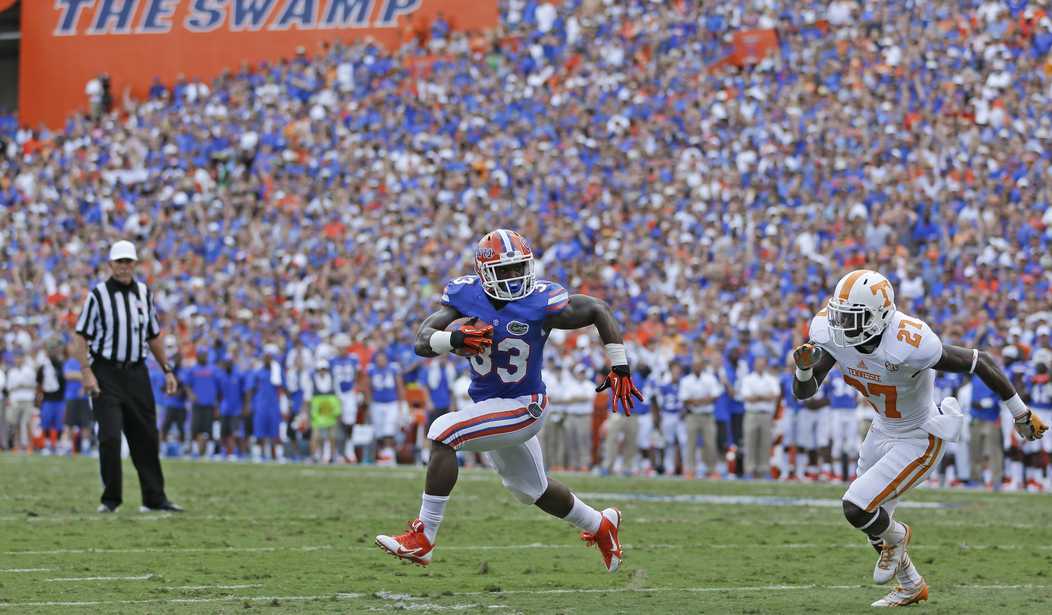However divided they may be on minor issues — spending, taxes, regulations, education, environment — there’s one thing every Florida lawmaker can agree on, and with the 2023 legislative season looming, this is The Big One: They don’t want Georgia and Alabama having all the fun, all the time.
Which is why the Legislature is expected to overhaul its second-in-the-nation statute regarding college athletes and the business of marketing their names, images, and likenesses, or NILs.
This is not to say Florida legislators were wrong to attempt to get out front after National Collegiate Athletic Assn. v. Alston, when a unanimous U.S. Supreme Court declared the NCAA violated antitrust laws by limiting opportunities for college athletes. The NCAA responded by drafting rules to accommodate athletes getting paid for their NILs. But in its attempt to erect sensible guardrails along an uncharted highway that ran through Florida, the Legislature actually laid unanticipated and unwelcome speed bumps.
The key problem with Florida’s NIL statute is its striking echo of federal election law regarding political action committees and candidates for office: While PACs and candidates share similar goals, it is illegal for them to coordinate activities.
Similarly, Florida’s NIL law prohibits schools from having direct involvement with athletes regarding NIL opportunities. The impulse may be a healthy one, even properly idealistic. But when subsequent state laws in other collegiate hotbeds — aforementioned Georgia and Alabama, but also California, Michigan, Ohio, Pennsylvania and Tennessee, to name just a few — allowed individual institutions to craft their own policies, Florida athletic programs found themselves hobbled.
Florida State University men’s basketball coach Leonard Hamilton during a September meeting of the school’s booster program described Florida as being in a “challenging” position when competing for recruits against schools in other states.
“From a state of Florida standpoint, some things we can’t say. In the state of Florida, I’m not really able to go out and talk to kids about NIL (name, image and likeness),” Hamilton said.
This week, bills designed to “level the playing field” for Florida schools and athletes were introduced in both houses of the Legislature.
Rep. Chip LaMarca, a Lighthouse Point Republican who has spent three years becoming an unlikely NIL expert, says the intent of the NCAA has become clearer — and less restrictive — over time. It’s time to let Florida catch up.
The proposed bill (HB 99) would allow more institutional involvement from universities and colleges regarding NIL. It would enable colleges, universities and its employees to steer NIL opportunities toward athletes. …
“If you think about what an athlete’s earlier life is like, no matter what their background is, they rely heavily on their coaches, the staff and the administration,” [LaMarca] said. “For them not to be able to have any conversations about what opportunities are out there was limiting our athletes.”
All of this is happening against the backdrop of, apparently, an NIL tender gone bad. No one has (so far) connected the debacle involving Pittsburg, Calif., five-star quarterback Jaden Rashada, the former jewel of the Florida Gators’ 2023 recruiting class, to the need for reform of the state’s NIL law. But wait.
It’s worth wondering whether things would have become an object lesson in reckless speculation if the university — specifically, the UF athletic department and head football coach Billy Napier’s staff — had been openly, officially providing advice and consent.
Rashada’s recruitment journey has, and continues to be, wildly wooly: Committed to the University of Miami (and a reported $9.5 million NIL package) in June 2022, Rashada flipped to Florida, not because of a sudden epiphany about wearing orange and blue in the stadium known as the Swamp, but because of a rumored $13 million NIL packaged put up by boosters known as the Gator Collective.
We know what you’re thinking: No way an 18-year-old who has never taken the proverbial first snap in a Southeastern Conference game is worth first-round NFL draft pick money. Maybe. Or maybe you should resign from the Adam Smith Invisible Hand Society, which says every service is worth exactly what the market decides. Rashada is a coveted IPO in an utterly new field of investment; it’s entirely possible irrational exuberance played a role, until it didn’t.
Rashada signed a national letter of intent in December, declaring he intended to enroll at UF in January. Now back home in the San Francisco Bay area, he’s asked for his release.
But his arrival in Gainesville was contingent on a four-year, $13 million NIL deal he signed with the Gator Collective, a person familiar with the situation told The Associated Press on condition of anonymity. The Gator Collective is an independent fundraising arm that disburses money to student-athletes in all sports. The financial backing fell through, however — the Gator Collective terminated the binding agreement — and left Florida coach Billy Napier to scramble to try to get Rashada to campus.
The legislation headed toward committee hearings and decision-making in the 60-day spring legislative session (opening March 7) might not avoid future egg-on-the-face moments for Florida schools. However, it is instructive to note that Georgia and Alabama, which currently set the bar for SEC (and, consequently, nationwide) excellence in football, are directly involved with NIL policies affecting their programs, and no recruits are bailing on them.
OK, OK, we’re joking about this spring’s No. 1 issue facing Florida and its legislators. (Or are we? In a three-year period ending with the pandemic-crunched 2020 season, Florida State generated an annual estimated value of $96 million, 15th in the nation; at $117 million, UF tied for 10th.) Still, wherever NIL law in Florida ranks, we expect the Legislature to be able to juggle and spin plates at the same time.
Because we are serious about Georgia and Alabama and Clemson and Miami and the rest having all the fun, all the time.







